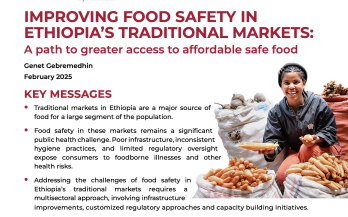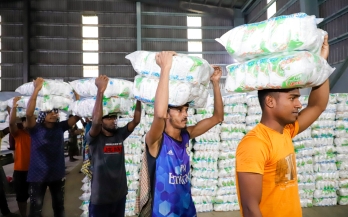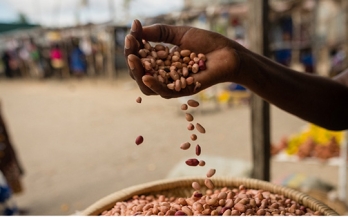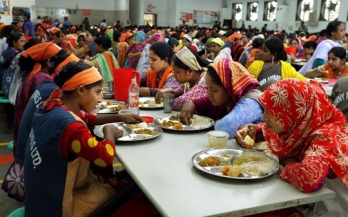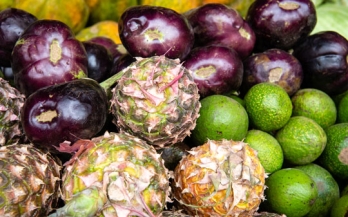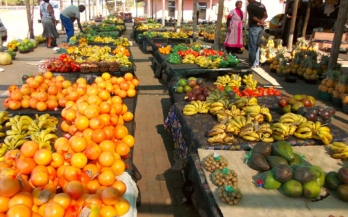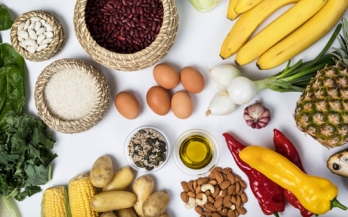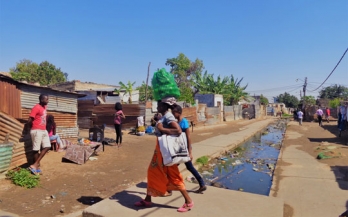Improving the quality of diets for rural populations is a key priority for many organisations – such as donors, implementing NGOs, and governments – in the nutrition sector. However, success at scale has been elusive.
GAIN, with the support of the Dutch Ministry of Foreign Affairs, embarked on a project to improve understanding of how to succeed at scale in rural settings. Eight other organisations (see background) also joined in this effort to pool their knowledge and experiences. Wellspring carried out a literature review in April-May 2024 and facilitated an in-person workshop in Utrecht in May 2024. This was followed by six online calls that focused on deeper discussion on six key topics identified based on the learning until then: dietary quality; segmentation; markets; scale; orchestration; and trade-offs.
Each topic has been covered under a separate GAIN convening paper. This overview aims to provide a short summary of each of the six topics.
Workforce Nutrition Programmes (WNPs) can improve the health of workers, but with
mixed results for a business case—which is crucial to their sustainability. This paper thus
explores impact pathways and metrics used to assess the business benefits of WNPs, as
well as the factors that influence the business case, with the aim of informing future
interventions and research.
Political economy dynamics—that is, conflicts and trade-offs across different interest groups that play an important role in the food system—permeate many decisions about food systems policy and implementation. Development practitioners working in the food systems space—inclusive of agriculture, nutrition, and environment—need to be aware of these dynamics to be able to support policy advocacy, development, and implementation.
To assist in anticipating policy bottlenecks to food systems transformation, a toolkit was developed to examine six main domains within national policy systems. The six domains are: policy stability and inclusionary decision-making, stakeholder preferences, multi-sectoral coordination, multi-level coordination, financing, and administrative capacities.
GAIN undertook an assessment of existing workforce nutrition-related policies to identify opportunities for improvement and generate insights into how policymakers and other policy stakeholders can contribute to healthier work environments. This briefing paper summarises the findings of a cross-cutting policy assessment for 12 countries across Africa, Asia, and Latin America.
Lower-income populations in low- and middle-income countries (LMICs) often face challenges accessing affordable, desirable, safe, and nutritious food, contributing to poor diet quality and malnutrition.
In advance of the 2022 AGRF Summit, the Global Alliance for Improved Nutrition (GAIN) and AGRA produced a report to provide African leaders with cutting-edge data tools to do just this. This briefing paper summarises the main results of that effort.
GAIN’s mission and strategy revolve around the core concept of "nutritious and safe foods". In addition, there is a growing consensus that foods should be produced sustainably - i.e., that one should take into account the environmental impact associated with the production of these foods.
In Ethiopia, per capita annual consumption of dairy is just 11% of World Health Organization recommended levels. Low incomes are a key constraint to dairy consumption, as many consumers cannot afford to buy dairy in recommended quantities. Key sector constraints are centred around rural scarcity, high prices, and quality concerns.
Despite Mozambique’s economic growth over the last decade, critical levels of stunting amongst the population persist, partly driven by inadequate nutrient intake. Eggs are an excellent and affordable source of protein and represent an opportunity to address nutritional deficiencies in the Mozambican population.


